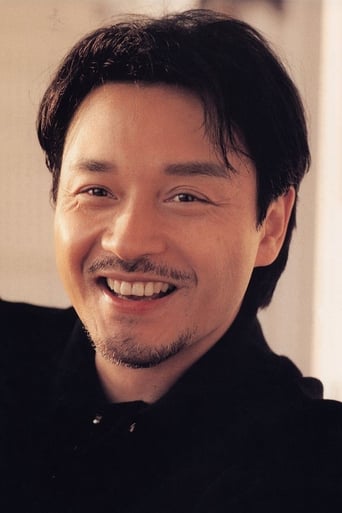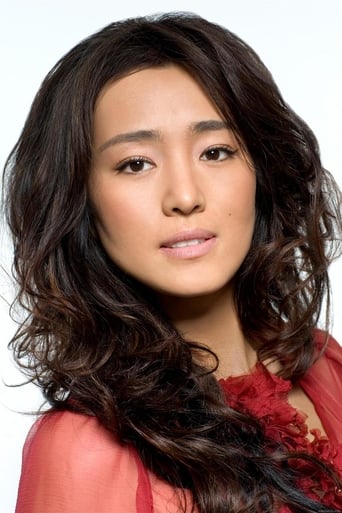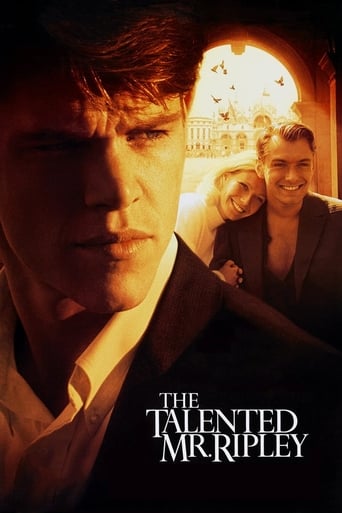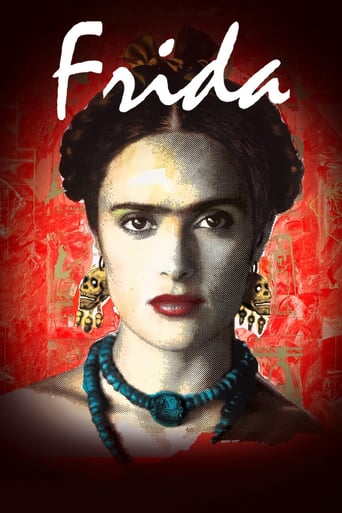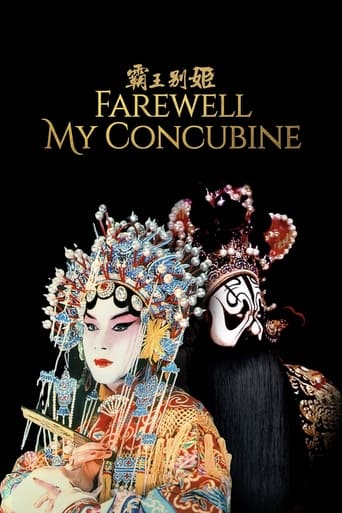
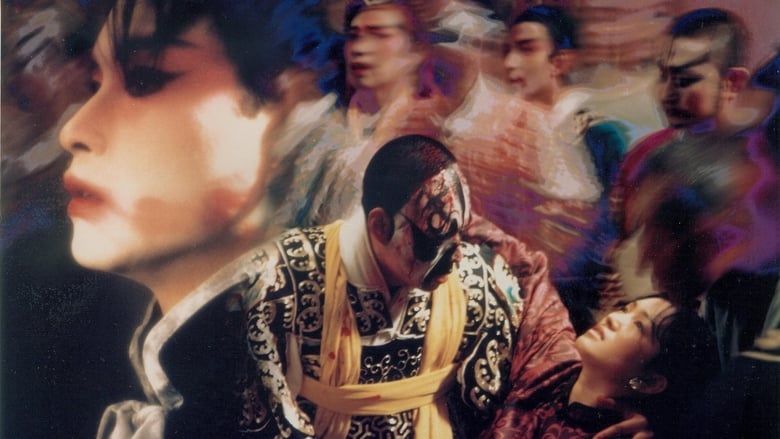
Farewell My Concubine (1993)
Abandoned by his prostitute mother in 1920, Douzi was raised by a theater troupe. There he meets Shitou and over the following years the two develop an act entitled "Farewell My Concubine" that brings them fame and fortune. When Shitou marries Juxian, Douzi becomes jealous, the beginnings of the acting duo's explosive breakup and tragic fall take root.
Watch Trailer
Cast


Similar titles
Reviews
A re-visit of this probably, most accoladed Chinese film in the 20th century, Canne's Palme d'or winner (an honor deservingly shared with Jane Campion's THE PIANO 1993), two Oscar nominations, and other awards galore. Directed by Chen Kaige, the trailblazer of "The Fifth Generation" directors (along with Zhang Yimou) in China, FAREWELL MY CONCUBINE has remained as his most intrepid and accomplished work ever, it is a chef-d'uvre goes right down in the annals of the entire history of cinema.The full version runs about 170 minutes, and spans over 50 years, it traverses through the turmoil times of contemporary China. Starting from 1924, in the Republic of China (1912-1949), a 9-year- old boy Douzi (Ma, Yin in different ages) is left by his prostitute mother (Jiang, in a devilish showy cameo) to a Peking Opera troupe, run by the rigorous Master Guan (Lv), under whose extremely strict coaching measures, where physical punishment is meted out on a daily base, Douzi is trained to play female roles due to his feminine appearance, and strikes an intimate affinity with a senior fellow apprentice Shitou (Fei and Zhao). An agonizing process of Douzi's dragooned shifting from cisgender to trans-gender paves the way for his success in the field, but also foreshadows his tragedy where he can no longer retract himself from his female character, Yuji, whom he plays in the traditional play "Farewell My Concubine", she is the loyal concubine of King Xiang Yu, played by Shitou. Projecting him and Shitou as Yuji and Xiang Yu, Douzi loses his grasp of the fine line between reality and performance, but Shitou isn't.Time jumps to the Japanese invasion in the 30s, when Dieyi (literally means butterfly's dress, the stage name of adult Douzi, Cheung) and Xiaolou (means small pavilion, the stage name of Shitou, Zhang) have become star opera singers, mostly for their collaboration of "Farewell My Concubine". A crack occurs, when a headline prostitute Juxian (Gong) contrives her way to marry Xiaolou as an opt-out from the whorehouse, the inseparability between Yuji and her King is deadly breached, Dieyi feels betrayed, but the show must go on. Through the rapid-changing political landscape of its time, from Japanese, Kumingtang, to the Communist Party, which established the PRC in 1949, until the Cultural Revolution in the late 60s, the trio experiences a string of tumultuous happenings: miscarriage, opium addiction, imprisonment, trial for treason, disciple betrayal, etc., which Chen dauntlessly brings about with no trepidation of the harsh censorship of the government (the film was denied a theatrical release in mainland China, for obvious reasons), and reach its apex in a heart-rending criticism and denunciation meeting encircled by the Red Guards, where Dieyi searingly lashes out his disillusion, spite and wrath, once and for all, it finishes with an abrupt but poignant suicide. Then, after out of contact over a decade long, the two brothers finally reunite on the stage for their grand finale with a highly cinematic coda.This is Hong Kong legendary star, Leslie Cheung's most audacious and dazzling endeavor, whose personal back-story (as a closeted gay man, he committed suicide on the April Fool's Day 2003 because of depression, at the age of 46) in retrospective makes his brilliant impersonation of Dieyi more plaintive and heart-breaking to watch, his impeccable semblance of a woman in full cosmetics is deceptively alluring, yet he is far from being a pretty face, his subtle facial impressions, gestures, line-delivery and body language all precisely hit the perfect note of a soul desperately clinging to his illusion, driven mad by jealousy, deeply disheartened and traumatized by the milieu.Zhang Fengyi's Xiaolou, wonderfully balances Dieyi's delicacy with his macho superiority and bluntness, which is tune with the strategy to intentionally sidestep the elephant-in-the-room in their relationship, and makes the case more like a meta-identity confusion tale than a taboo- divulging melodrama, homo-erotic tension has been mostly taken out, whereas vignette between Douzi and a senior eunuch is not for the faint-hearted. Xiaolou is only the king in the opera, back to reality, his virility is a false front, and he is ready to snitch on everyone when difficult time approaches, but we cannot blame him, he is no hero, but an ordinary man tries to save his life, most of us would do the same, right?Gong Li, the goddess of contemporary Chinese cinema, grabs a meaty supporting role here, becomes the unwelcome third wheel among the two men, her Juxian, is a woman knows what she wants and never hesitates to get it, she is tough, manipulating but not vicious, one of the most poignant moments is when she and Dieyi establishes a semi-mother-and-son bond during the latter's cold turkey period, that is the only time, hostility caves in to warmth and affections, yet it is evanescent, her only mistake is that she puts all her stakes on a wrong man and sticks to him afterward, among all the main characters, she is the most ambiguous one but Gong's expertise makes her the most sympathetic one too.Gu Changwei's Oscar-nominated cinematography, the exotic atmosphere around Peking opera scenes and a distinctively oriental score by Zhao Jiping, even popular comedian Ge You's subdued performance in a drama role, one can ramble on and on, but in the end of the day, it needs to be seen by more audience, particular young Chinese filmmakers, simply to show the world that Chinese cinema can produce masterpieces despite that it has been stuck in the dry spell for too long, with an ostensibly booming market congested with utterly inferior commodities.
An intriguing tale, with a fascinating chunk of modern Chinese history serving as the background. Spanning over 50 years, the film tells about the ups and downs of a traditional Peking Opera troupe, and its two stars, from 1924 to 1977. Not only do we see the various political events of the time, but also how the traditional opera and its stars are treated during different eras.The two stars, Dieyi and Xiaolou, are brought up and trained to play specific roles - that of concubine and king respectively - in a famous play. Dieyi (Douzi) is trained, or should I say, forced to behave, sing, move and dance like a girl, from a very young age. The two of them share a unique and close bond, and this balance gets affected when a woman, Juxian, enters the picture. Their political naiveté get them into many problems, but it's their properly unresolved love triangle that causes more trouble.The lines between fact and fiction are blurred when we realise the similarities between the play and their actual lives. Dieyi's devotion to opera and Xiaolou are as strong as the concubine's devotion to the king. (The lines are blurred even more when Leslie Cheung, bisexual himself, takes his life in 2003) The end is inevitable, as we realise while the story progresses, but it's reached with proper momentum and after an intriguing chain of events.The acting by the three leads is really terrific. Leslie Cheung as the female-role playing opera star who's completely devoted to his art, Fengyi Zhang as a talented and playful man who can easily separate his private and work lives, and Gong Li as the prostitute-turned-wife whose shades of determination and compassion keeps us from not having a fixed view of her character. With Chen Kaige's talented direction and Gu Changwei's spectacular cinematography, the movie has many colourful and memorable scenes.I really liked the movie, and wasn't bored for a single second. The movie deals with so many interesting themes - Modern Chinese history, sexuality, art and its reception, devotion and passion - but yet it somehow makes me feel that it had the potential to be much more compelling. Other than the political events, the characters could have been explored a little more.
I'm beginning to wonder if you can't measure a society's participation in the global economy of what used to be called "the free world" by the quality of its movies. China is still a monolithic and authoritarian structure but it's loosening up. It was only ten or so years ago that a friend who had visited mentioned that there were only ten McDonald's in all of Beijing. Now the city is more sophisticated than the one I live in, which is served by a weekly train of burros from the nearest cavalry fort. "Starbucks" is the name of the Mimbreno Apache who brings me an occasional jack rabbit carcass.But, all seriousness aside, this is a pretty good, and quite subtle and adult, film. It's a longie, so I was unable to catch the last half hour or so, but what I did see should be applauded for its acting, direction, and production design.It squeezes a long period of time, from 1932 to beyond Mao's take over, into the story of two orphan boys at a school that trains performers for Chinese opera. The female parts are played by men and boys, as in Shakespeare's time, and in fact Cheung, who plays the female part, looks pretty appealing in make up. Cheung's friend, Zhang, is masculine and plays the role of the King of Chu in gaudy make up.Chinese opera is a demanding art. As children, the two friends are beaten without mercy -- and I mean BEATEN -- for any mistakes they make. One of them is beaten even when his recitation is perfect, "to remind you how good you were." The two grow up to become famous actors in the opera -- Zhang as the demanding and desolate king, and Cheung as his devoted concubine who kills herself.But then -- cherchez la femme. And who is the femme? The luscious and beautiful Gong Li (or Li Gong, to put her clan name first.) She's a knockout. It's no wonder that she's able to finagle Zhang into rescuing her from the whorehouse -- The House of Blossoms -- and marrying her. But, as new wives will, she's jealous of Zhang's close friendship with Cheung, who by this time has become gay. Disruptions ensue. Politics rears its ugly head. And at that point -- three in the morning -- I had to shut it off and go to bed.I don't know what happens at the end. I hope Cheung gets his head straight and becomes heterosexual again, that Zhang is satisfied with the arrangement, and that Gong Li becomes an eager participant in a polyandrous marriage. Things would be so much easier all around.
Farewell My Concubine is a Chinese film that stars Leslie Cheung, Gong Li and Zhang Feng-Yi together with Lu Qi, Ying Da, Ge You and David Wu. It is similar to other Fifth Generation films like To Live and The Blue Kite, the movie explores the effect of China's political turmoil during the mid-20th century on the lives of individuals, families, and groups, in this case, two stars in a Peking opera troupe and the woman who comes between them.The film is an adaptation of the novel by Lilian Lee. Lilian Lee is also one of the film's screenplay writers.It was directed by Chen Kaige.Not many people were aware that most members of the Peking Opera were originally orphans or illegitimate castaways with nowhere else to turn. Such is the case of Duan Xiaolou and Cheng Dieyi, two homeless outcasts, trained from childhood in the grueling rigors of the Opera by master Lu Qui in the film.It traces the 52-year friendship between Xiaolou and Dieyi, a friendship pockmarked with fiery conflicts and tender reconciliations. Though the delicate Dieyi specializes in female roles and the gutsy Xiaolou plays noble warriors, theirs is an essentially heterosexual relationship; still, when Xiaolou takes upon himself a prostitute bride, Dieyi is as petty and jealous as an outcast mistress. Farewell, My Concubine holds the viewer in thrall from start to finish; as such, it is thoroughly deserving of its many international film awards and nominations.No question that this is a classic film on its own as it has all the elements of a great film.The performances were brilliant and outstanding especially that of Gong Li.It was visually stunning as well.The screenplay was intelligent and outstanding while the characters are emotionally involving as the viewer will care and sympathize with them.And most of all,the direction of Chen Kaige is superb and marvelous.I give this film a very high recommendation as a must-see movie.


